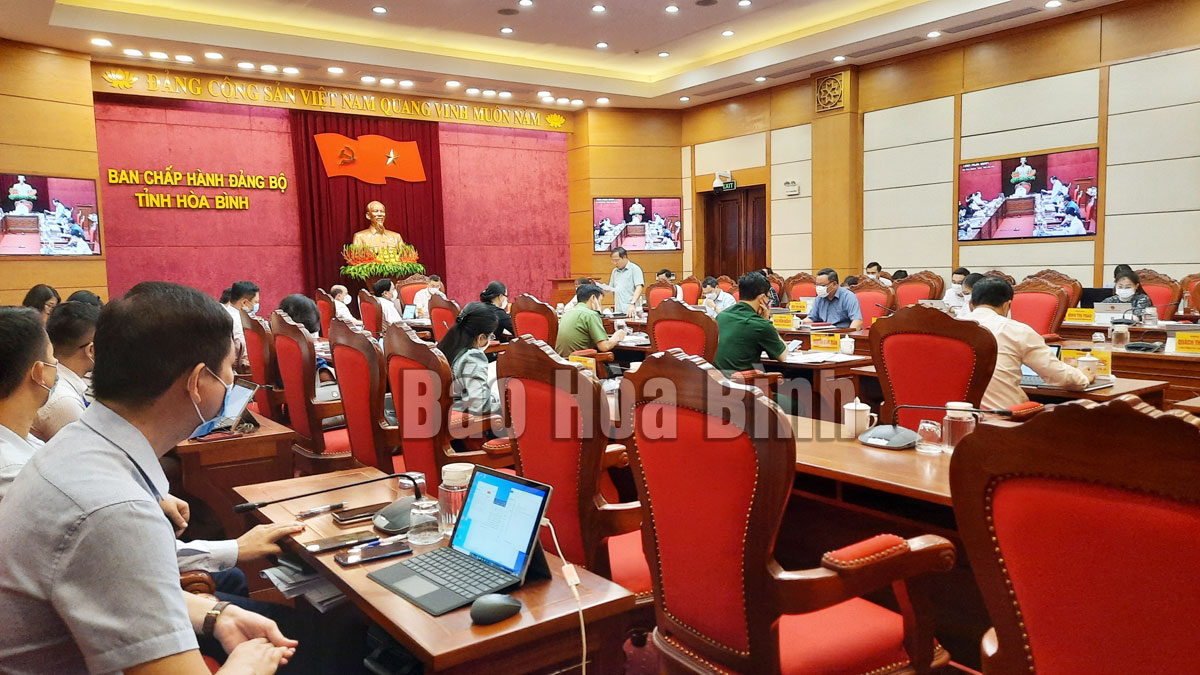
(HBO) - A meeting of the Standing Board of the Hoa Binh Provincial Party Committee was successfully held in the "paperless” form in early August.

Photo: A meeting of the Standing Board of the Hoa Binh Provincial Party Committee held in the "paperless” form in early August.
The meeting fulfilled the target of reducing the number of
printed papers, thus saving money and cutting down the preparation time. The
quality of the meeting was improved, and leaders were able to make decisions in
a timely, swift and accurate manner.
The method has contributed to administrative reform toward the building of the
e-administration in line with the integration trend and regulations of COVID-19
prevention and control.
The model was jointly developed by the Vietnam Posts and
Telecommunications Group (VNPT) and Viettel Military Industry and Telecoms
Group. All of the process will be held via the e-document system.
Prior to meetings, the agenda and documents will be prepared,
reviewed, approved and updated onto the system to give participants time to
study. Participants can access many relevant documents at the same time via
smart devices like computers, tablets and smartphones.
In addition, the method offers functions such as a map of the meeting room,
registration to voice opinions, participant management, voting and virtual
signing ceremony, which help the chairperson run the meeting effectively.
Realising the importance of the Fourth Industrial Revolution
(4IR) and ICT application in the management of agencies and organisations, the
Office of the provincial Party Committee proposed that the Party Committee and
its Standing Board carry out the "paperless” meeting method to reduce the
number of hard copies so as to save costs and quickly update information,
contributing to administrative reforms in the operation of the Party
Committee.
The move also improves the working manner and process, as well
as operations of Party organisations towards the building of the e-administration
and gradually meeting requirements of the 4IR and international integration. It
is expected to raise the quality and efficiency of meetings of Party
organisations in the province.
Moreover, the method supports the holding of urgent meetings for
security-political issues, socio-economic development and disasters, among
others, helping local leaders quickly give frequent and constant instructions
during incidents./.
Hoa Binh province is undergoing a dynamic transformation amid Vietnam’s national digital transition. Building on Poliburo’s Resolution No. 57-NQ/TW on breakthroughs in science, technology, innovation, and national digital transformation, the province has rolled out a wide range of practical action plans. A standout initiative is the "Digital Literacy for All” movement, an effort to ensure that no one is left behind in the digital era.
Hoa Binh province is undergoing a dynamic transformation in the wake of the national digital transformation movement. Building on Resolution No. 57-NQ/TW of the Politburo on breakthroughs in science, technology, innovation, and national digital transformation, the province has implemented a wide range of practical action plans. A standout initiative is the "Digital Literacy for All” movement ambitious effort to ensure that no one is left behind in the digital age.
With a spirit of unity and proactive problem-solving, the Party Committee, the government and the people of Dong Lai Commune (Tan Lac District) have made great strides in implementing the resolutions of the 24th Party Congress of the commune for the 2020 - 2025 term. Focusing on leadership and practical actions, the commune has brought the Party’s resolutions into daily life, creating strong impacts and pushing the local development forward.
Amid the nationwide push for digital transformation, young people in Hoa Binh Province are stepping up as dynamic pioneers, applying technology to enhance Youth Union operations and expand the reach of youth-led initiatives. Through creativity and adaptability, Youth Union organizations at all levels have introduced a series of practical solutions, contributing to modern governance and community development.
In recent years, An Nghia commune, located in Lac Son district, has stepped up administrative reform, focusing on improving the quality and efficiency of its single-window service unit for receiving and processing administrative procedures. These improvements have helped create favourable conditions for local residents and organisations to handle administrative procedures, contributing to the commune’s broader socio-economic development.
The Prime Minister-approved master plan to develop the multi-use value of forests ecosystems through 2030, with a vision to 2050, aims to improve the management and sustainable use of forest resources, create jobs, increase incomes, and improve the living standards of ethnic minorities, people in mountainous and remote areas, forest workers and those living near forests.



